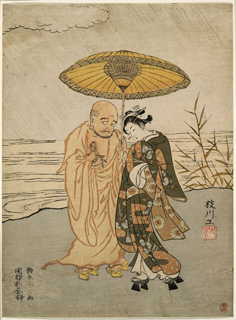Hidden Gem: Art Institute’s Buckingham Gallery and Japanese Woodblock Print Collection
By JoshMogerman in Arts & Entertainment on Jan 8, 2011 9:15PM
The Art Institute’s current run of free days reminded us of one of the museum’s coolest and most memorable features. No, not the lions, the impressionists, or super-cool suits of armor (oh, we’ve loved that gallery since our awkward Dungeons and Dragons phase). Tucked away in a quiet section on the first floor you will find a space devoted to one of the art world’s most unique collections: The Clarence Buckingham Gallery which highlights one of the nation’s largest collections of Japanese woodblock prints.
Deep in the bowels of the museum, almost 16,000 Japanese prints are stored. Most came as part of a 1925 gift from Kate Buckingham (of the fountain fame) who specified in her will that they should remain on constant view. As a result, the entire gallery display is swapped out every three months, with new themes each time. The regular refresh addresses not only conservation concerns (most of the pieces are from Japan’s Edo period from 1615 to 1868 with paper and pigments that can be discolored with too much exposure to light), but allows Curator Janice Katz, to highlight an array of artists and subject matter. The result is an ever-evolving and never-ending window into Japanese culture and countryside. Where else can you get such a unique peek at samurai, courtesans, agriculture, and exotic fashion in Chicago?
When asked about her favorite pieces in the collection, Katz replied “We can show the prints for only three months every five years, so even if I like something, I'll have to wait five years to put it on display again. So, I try not to get too attached...” We second that. Despite regular trips to the gallery, we’ve never seen the same piece twice. It’s a new experience every time.
And this month highlights the incredible diversity of the collection. Sunday marks the end of the current show, “The Jack D. Beem Collection: Emerging Japanese Print Artists of the 1960s, 1970s, and Beyond.” After a changeover during the week, the gallery shifts from more contemporary subject matter to "Egoyomi: Picture Calendars for the New Year," which will run from January 15 to April 3, featuring pieces from the 1700’s. The artworks are incredibly accessible and engaging, but gallery talks are presented almost every month in the space to help you grasp the subtleties---and there are a lot of those, just read the full caption to the image above:
Suzuki Harunobu Japanese, 1725-1770 Daruma and a Young Woman in the Rain, 1765 Color woodblock print; chûban Clarence Buckingham Collection, 1930.376Here the Zen patriarch Daruma is shown consorting with a courtesan. The nervous look in his eyes makes the scene all the more amusing. Calendar markings for the year appear within the design. Within medallions on the woman’s sash are the numbers for the short months of 1765, and the numbers of the long months are cleverly hidden in Daruma’s chest hairs. The sequence of long and short months changed annually.
Privately commissioned calendar prints such as this actually defied the laws of the ruling shogunate, as only a handful of publishers were officially allowed to produce calendars for the public. It has therefore been argued that calendar markings were hidden in order to obscure the true purpose of these prints. To what extent the designs actually misled the authorities, however, is a matter of debate.
Wow. Don't let that be your only cultural nugget for the week though---make sure to take advantage of both shows while admission is free on select days.
